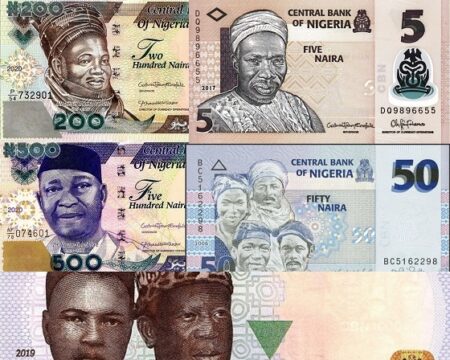The volume of Currency-In-Circulation (CIC) in Nigeria by December 2020 was 10,454,976,030, valued at NGN2,907,126,778,815.31 as against 2019, when there was a volume of 9,400,994,069 valued at NGN2,441,656,697,130.31, more naira were in hands in 2020 than 2019.
Nigeria witnessed an increase in CIC from NGN2,441.67 billion in 2019 to NGN2,907.13 in 2020. That’s an increase of 19.06 percent, according to the Currency Operation Department 2020 Annual Report by the Central Bank of Nigeria
The Currency Operations Department is one of the cardinal backbones of Nigeria’s apex bank which carries out CBN’s Legal Tender Currency Issuance in Nigeria. It is also in charge of procurement and distribution of foreign currency activities.
There were more withdrawals in 2020 than they were in 2019, this could be attributed to the pandemic as more Nigerians store more cash at home to attend to emergencies and reduced banking hours due to restrictions to curb the spread of the pandemic.
How The Currency Denominations Performed
Higher denomination banknotes like NGN1,000, NGN500, NGN200, and NGN100 were more in circulation. In terms of volume and value, the higher denomination accounted for 63.47 percent and 98.08 percent respectively.
Lower denominations like NGN50, NGN20, NGN10, and NGN5 accounted for 28.43 percent of the total CIC and 1.92 percent, in terms of value as at end-December 2020, the report says.
| Denomination | 2019 | 2020 | ||
| Volume | Value | Volume | Value | |
| NGN1000 | 1,460,440,396 | 1,460,440,395,940 | 1,678,267,302 | 1,678,267,302,125 |
| NGN500 | 1,421,271,966 | 710,635,983,235 | 1,844,065,204 | 922,032,602,068 |
| NGN200 | 726,223,606 | 145,244,721,259 | 850,479,766 | 170,095,953,176 |
| NGN100 | 693,497,610 | 69,349,761,004 | 792,630,544 | 79,263,054,350 |
| NGN50 | 502,453,584 | 25,122,679,200 | 486,014,057 | 24,300,702,846 |
| NGN20 | 934,295,458 | 18,685,909,154 | 1,014,135,703 | 20,282,714,060 |
| NGN10 | 768,823,285 | 7,688,232,855 | 783,691,851 | 7,836,918,511 |
| NGN5 | 576,912,627 | 2,884,563,135 | 688,616,066 | 3,443,080,331 |
| NGN2 | 204,367,122 | 408,734,244 | 204,367,122 | 408,734,244 |
| NGN1 | 736,049,332 | 736,049,332 | 736,049,332 | 736,049,332 |
| 0.5 | 681,478,816 | 340,739,408.11 | 681,478,816 | 340,739,408.11 |
| 0.25 | 348,225,432 | 87,056,357.95 | 348,225,432 | 87,056,357.95 |
| 0.1 | 315,582,866 | 31,558,286.56 | 315,582,866 | 31,558,286.56 |
| 0.01 | 31,371,969 | 313,719.69 | 31,371,969 | 313,719.69 |
| TOTAL | 9,400,994,069 | NGN2,441,656,697,130.31 | 10,454,976,030 | NGN2,907,126,778,815.31 |
| Source: COD 2020 Annual Report, Central Bank of Nigeria (CBN) | ||||
Why this significant?
The low circulation of the lower currency may hugely be attributed to two major things:
Inflation in the price of goods and services. For instance, NGN5 can no longer buy a sachet of buy water unlike in the 1990s when NGN5 was a valuable currency.
Two, lower denominations at hand means more load. For instance, a typical market woman would prefer to hold higher denomination for her tasks at the market.
The volume of NGN20 denomination increased significantly in 2020 compared with 2019, this is also significant. Some of the little things that were initially selling for NGN10 or lesser have jumped to NGN20. In fact some of the biscuits that were sold for NGN5/1 go for NGN20 per three pieces.
Estacode and BDC Funding Were Burden To Nigeria’s Economy
While it may be early to conclude if the action the CBN to stop the sales of foreign exchange to hundreds of Bureau De Change operators until 2020 by which time the apex bank would have released its 2021 report, the 2020 report has however shown that there are lots of leakages straining troubled Africa’s largest economy.
In the COD 2020 report, CBN says it bought USD1,830,000,000.00 to service and meet the demand of estacode of Nigerian politicians and government officials.
Part of the USD was also used to fund the operations of BDC operators, who ceased to be on CBN’s list since July 27 when Godwin Emefiele, disclosed that “enough is enough” since the BDCs were no longer serving the purpose of their establishment.
CBN Spends NGN58.6 billion to more notes
Of all the data, what caught the attention of Nigerians most is the claim by the apex bank that it spent N58.618 billion to print 2.518 billion of naira notes, valued at N1.06trn in 2020.
eNaira Forecast:
The launching of eNaira in October is most likely going to pull down the volume of fiat currency (physical naira) in circulation if the apex Nigeria’s bank makes the app usable and easy for Nigerians.
The eNaira is Nigeria’s digital currency, the first in Africa. The review about the app isn’t palatable on the Google Playstore as more people say they couldn’t sign up or log in, which is likely to affect its adoption by Nigerians.
Some financial analysts say CBN should have diverted its energy at stabilising its fiat currency before launching a digital coin. The apex bank says it doesn’t matter.

